FAIRHOPE — Have you ever stopped to think about what happens to the over-ripe fruit, wilted lettuce or dinner leftovers after it goes in your garbage can? The Fairhope Worm Lady is trying to …
This item is available in full to subscribers.
Please log in to continue |
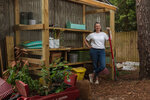
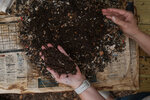
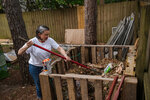
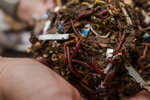
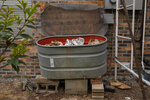
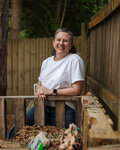
FAIRHOPE — Have you ever stopped to think about what happens to the over-ripe fruit, wilted lettuce or dinner leftovers after it goes in your garbage can? The Fairhope Worm Lady is trying to change the way city residents dispose of their organic and food waste.
Scraps that can be composted, like food waste, paper and egg cartons, do nothing to give back nutrients to the earth if they sit in a landfill. The Fairhope Compost Project is a new initiative (still in the initial stages) that Sarah Bogdanovich has established with the goal of 1,000 local families composting their food scraps and organic waste by Earth Day 2025.
Bogdanovich said she became curious about what happened to waste at a young age in her downtown Mobile home. She said she had a lot of time to think as a latchkey, only child. As a middle schooler, she came up with an idea for her science fair project based on her interest in what happens to waste: a hydroelectric sewer system.
"I have no idea how I thought of that. Everything I had to go through to find someone to help me build an example was really embarrassing," Bogdanovich said with a laugh. "We found a family friend that helped me build. The idea was underground you would have a catchment system for all the wastewater, and you would filter out the solid waste and the rest would run the block and create a hydroelectric system. I was always trying to think of sustainable stuff."
She realized early that stuff doesn't just go away. Her curiosity didn't follow her through the educational system. She decided to follow her other passion in college: people and how they get through difficult times. That led her to work in disaster response with the Red Cross and now therapy, but there has always been an underlying fascination with what is happening to all this waste.
While living in Hawaii early in her marriage, Bogdanovich was digging in the yard and found a worm.
"I remember at that moment just saying, 'Don't worms eat garbage?' It wasn't even the type that compost, but I thought it was interesting," she said. "I started going down this weird rabbit hole because I had nothing else to do because I wasn't working yet. I ended up contacting the Waikiki Worm Company. She kind of became my mentor."
Soon, Bogdanovich started her first worm bin using a plastic sweater box from Target under a bench on her porch. Every place they moved, she would start a new worm box, learning as she went. One important thing she learned along the way is the decision point on what to do with waste before it even leaves the house.
"I find the trick is to make the decision point in your home as soon as the thing becomes trash or not supposed to be in the house. There has to be a place for that," she said. "If you have to take too much time in that moment, you are not going to do it."
Her house has two compost bins in every room that produces waste. One is for her worm bin while the other is for a wooden bin where she composts scraps the worms don't eat, like onions and citrus rinds.
After years of learning from trial and error and then helping friends get started, she is ready to help others on a larger scale. Although in its infancy, The Fairhope Compost Project has a well-defined concept and goals. Along with showing people that composting is approachable, Bogdanovich would like to find locations and volunteers to start community compost locations, teach workshops and get local schools and businesses to participate.
According to her research, if 500 families diverted just half of their food waste to an on-site compost bin, Fairhope would divert 84,500 pounds of garbage from the Magnolia Landfill. She estimates the savings to the city at over $700,000.
"If we don't manage our waste well as a community, we are all just going to be living on top of a landfill. (Fairhope) will be cute, but it will be on a landfill," Bogdanovich said. "Part of what I have been trying to do for years is figure out how we manage waste in mass in a way that is not intrusive or gross but also holds us accountable for what we produce."